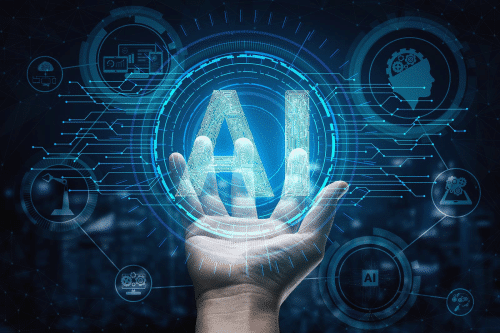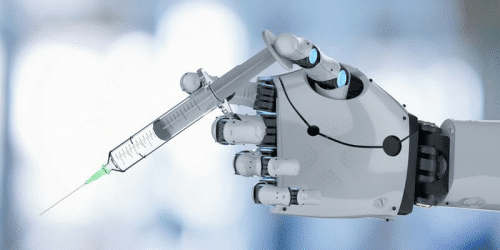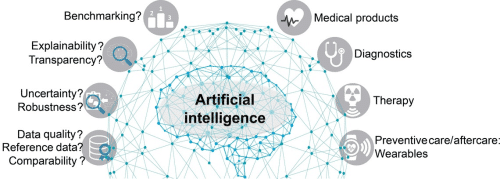
فهرست داخلی
Revolutionizing Healthcare: Unleashing the Power of Artificial Intelligence

Artificial intelligence
Artificial intelligence (AI) has the potential to revolutionize the medical industry by improving the accuracy and efficiency of diagnoses, reducing healthcare costs, and enabling the development of new treatments.
One area where artificial intelligence has already had a significant impact is in medical imaging. Artificial intelligence algorithms can analyze medical images such as CT scans and X-rays and identify abnormalities or diseases with high accuracy. This can help radiologists make more accurate diagnoses and ultimately lead to better patient outcomes.
Artificial intelligence and electronic health
Another area where artificial intelligence is being used is in the analysis of electronic health records (EHRs). AI algorithms can sift through large amounts of patient data and identify patterns or risk factors that may not be apparent to human doctors. This can help in the early diagnosis of diseases and help develop personalized treatment plans.
Contribute to drug discovery and development
Artificial intelligence is also being used to aid drug discovery and development. Machine learning algorithms can be trained to analyze large amounts of data from drug trials and identify potential new drug candidates. This can speed up the drug development process and lead to the development of more effective treatments.
However, it is important to note that AI and machine learning are still in their early stages of development, and there are still many challenges to overcome before their full potential can be realized. Additionally, it is important to note that AI should be used as a tool to assist doctors, not replace them.
Artificial intelligence, or AI for short, is a way for computers to do things that would normally require human intelligence to do them. For example, an AI program could look at images and tell you what’s in them, or it could help doctors figure out how to make people better when they’re sick.
Just like how babies learn and grow, artificial intelligence learns from the information it is given and gets better at doing things. This means that the more information the AI has, the better. Imagine you are playing a game on your computer and the computer is your opponent, the more you play with it, the better it gets at playing the game.

Simple explanation:
Artificial intelligence is used in many different fields such as medicine, transportation and even in robots that help people. In medicine, AI can help doctors find problems and ensure your health by analyzing images of your body. In transportation, AI can help cars drive themselves so they don’t crash into each other. And in robots, AI can help by allowing them to understand what people are saying and give them a helpful response.
Artificial intelligence is a very powerful tool that can improve our lives in many ways. But, it’s important to remember that it’s just a tool and should be used to help people, not replace them. Just like you need your parents and teachers to help you learn and grow, we need people to help us make sure AI is used for good and not evil.
AI:
It is likely that at the current rate of technological advancement, we will continue to see the evolution of artificial intelligence in various industries in the next few years. Advances in technology such as deep learning and neural networks have enabled the development of more powerful and sophisticated AI systems, leading to the integration of AI into various fields such as healthcare, transportation, finance, and many others.
In the healthcare industry, artificial intelligence is used to analyze medical images, identify patterns in electronic health records, and aid in drug discovery and development. Integrating artificial intelligence into healthcare has the potential to improve the accuracy and efficiency of diagnoses, reduce healthcare costs, and ultimately lead to better patient outcomes.
In the transportation industry, we are already seeing the development of autonomous vehicles that can drive themselves. The integration of artificial intelligence in this field has the potential to improve road safety and reduce traffic congestion.
In finance, artificial intelligence is used to analyze large amounts of financial data, identify patterns, and make predictions. This can help develop more effective financial strategies and ultimately lead to better financial results.
With the rapid advancement of technology, it is likely that we will see the integration of artificial intelligence in various industries in the future. However, it is important to note that the integration of AI requires balancing its potential benefits and risks and must be used ethically and responsibly.
There are several categories in which artificial intelligence (AI) has the potential to make significant progress in the future:
- Natural Language Processing (NLP): AI has already made significant progress in understanding and generating human language, but there is still a long way to go. In the future, we can expect to see AI systems that can understand and respond to human speech and text in a more natural and human-like way.
- Computer Vision: AI has already made significant progress in analyzing images and videos, but there is still a lot of room for improvement. In the future, we can expect to see AI systems that can understand images and videos in a more human-like way and make predictions or take action based on what they see.
- Robotics: AI has already been used to control robots and make them more autonomous, but there is still a lot of room for improvement. In the future, we can expect to see robots that can move and manipulate objects in a more human-like way and perform tasks that are currently too dangerous or difficult for humans.
- Healthcare: AI has already been used to analyze medical images and assist in drug discovery and development, but there is still a lot of room for improvement. In the future, we can expect to see AI systems that can assist doctors in making more accurate diagnoses and developing personalized treatment plans.
- Autonomous Systems: AI has already been used to control autonomous vehicles and drones, but there is still a lot of room for improvement. In the future, we can expect to see AI-controlled systems that can operate more autonomously and make more complex decisions.
- Finance: AI has already been used to analyze financial data, identify patterns, and make predictions, but there is still a lot of room for improvement. In the future, we can expect to see AI systems that can assist in the development of more effective financial strategies and ultimately lead to better financial outcomes.
It’s important to note that AI is a rapidly developing field and new areas of progress may emerge as technology continues to evolve. Additionally, it’s important to note that the integration of AI will require a balance between its benefits and its potential risks and it should be used ethically and responsibly.
Natural Language Processing (NLP): Artificial intelligence has already made significant progress in understanding and producing human language, but it still has a long way to go. In the future, we can expect to see AI systems that can understand and respond to human speech and text more naturally.

Artificial Intelligence, Clinical decision support, Computer vision, Deep learning, diagnosis, Drug discovery, Electronic health records, Healthcare, Machine learning, Medical imaging, Medicine, Natural Language Processing, Patient outcomes, Personalized medicine, Predictive analytics, Revolution, Robotics, treatment









1 دیدگاه دربارهٔ «Revolutionizing Healthcare: Unleashing the Power of Artificial Intelligence»
Great information shared.. really enjoyed reading this post thank you author for sharing this post .. appreciated